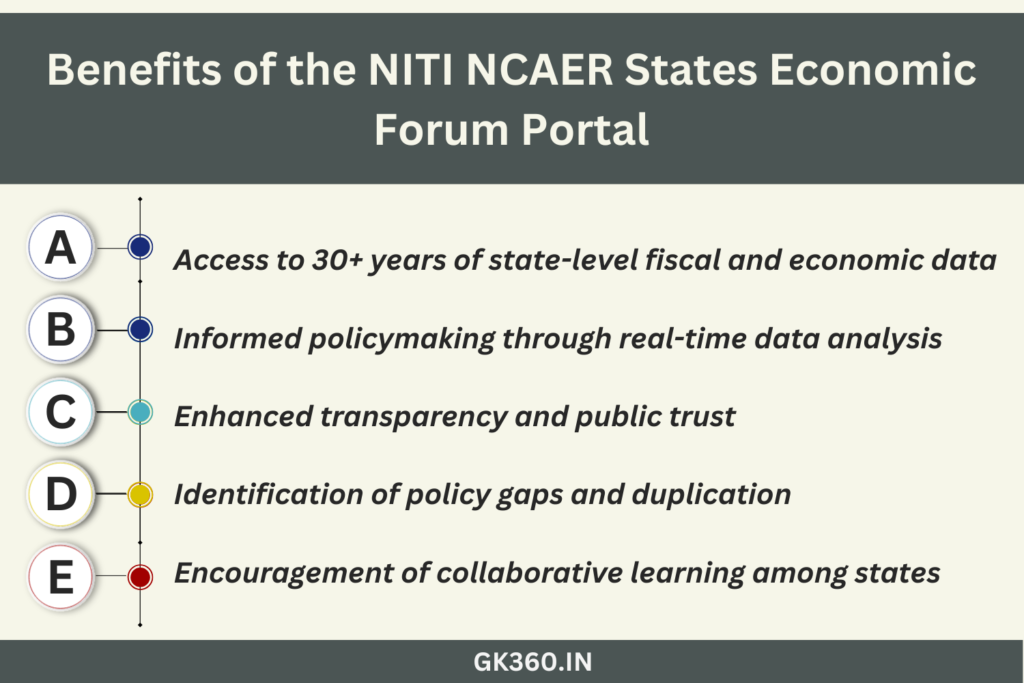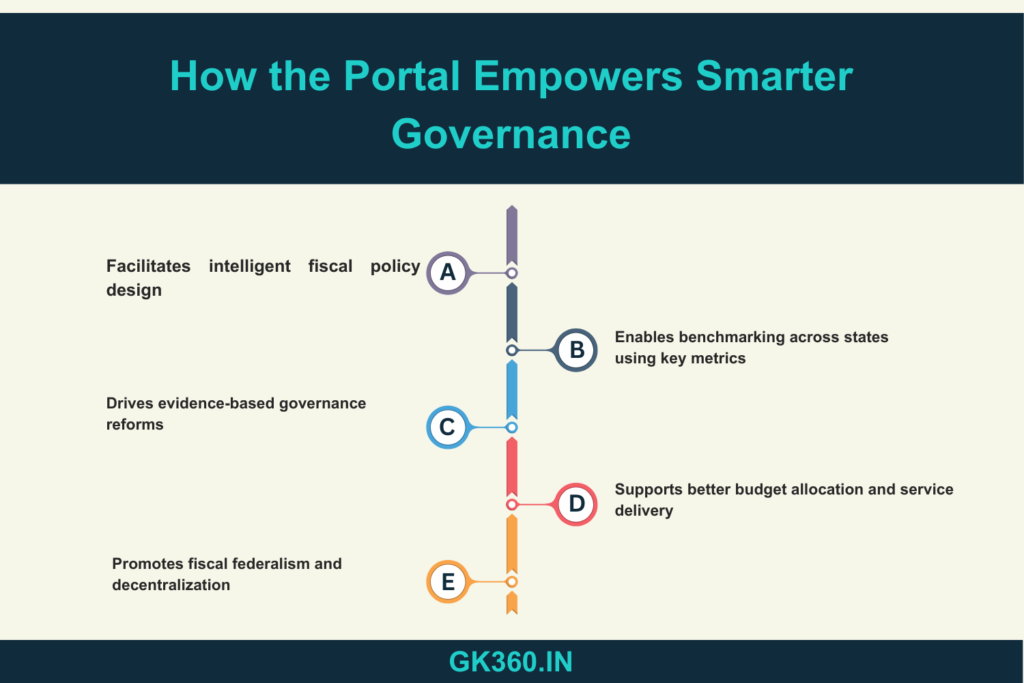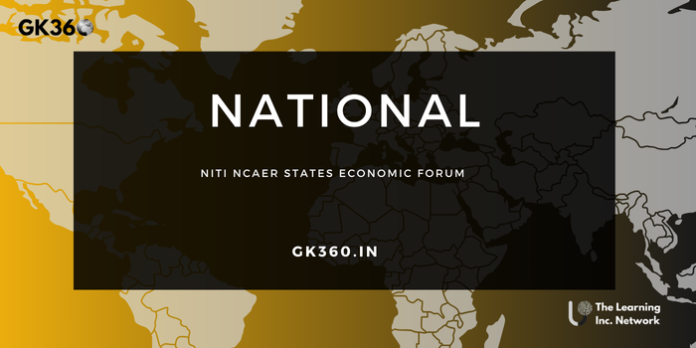India’s New Fiscal Dashboard: NITI NCAER States Economic Forum Portal Explained
India has entered a new era of data-driven governance with the launch of the NITI NCAER States Economic Forum Portal. Unveiled by Finance Minister Nirmala Sitharaman on April 1, 2025, in New Delhi, this collaborative initiative between NITI Aayog and the National Council of Applied Economic Research (NCAER) aims to transform how Indian states make fiscal and policy decisions.
The portal is a first-of-its-kind interactive fiscal data platform offering over 30 years of state-level economic, social, and financial indicators—from 1990-91 to 2022-23. With the increasing complexity of state finances and rising citizen expectations, this tool offers a transparent, unified, and evidence-backed foundation for public finance management.
Whether you’re a policymaker, researcher, or an engaged citizen, the platform provides a powerful resource to optimize budgets, track debt trends, and benchmark policy outcomes across India.

Table of Contents
- About the NITI NCAER States Economic Forum Portal
- Key Features of the State Economic Data Platform
- How the Portal Supports State Policy Planning
- Insights from Finance Minister and Economic Leaders
- Why This Portal is a Game Changer for Fiscal Federalism
- Long-Term Benefits of a Transparent Data Ecosystem
- Real-World Use Cases: How States Can Benefit
- FAQs About the State Economic Forum Portal
- Conclusion: Building Smarter States Through Data
About the NITI NCAER States Economic Forum Portal
The States Economic Forum Portal is a joint endeavor by NITI Aayog and NCAER, aimed at improving state-level fiscal governance through data transparency and analytical tools.
This centralized platform provides users with:
- Over 30 years of state-wise economic, social, and fiscal data
- Intuitive charts, comparative dashboards, and exportable datasets
- Direct access to indicators such as revenue, expenditure, debt, and development spending
The objective is simple: empower policymakers and analysts with timely, accurate, and actionable data to shape more responsible, transparent, and efficient public policy.
Key Features of the State Economic Data Platform
Here’s what makes this platform a game-changer for India’s fiscal future:
Comprehensive Database
- Covers 1990-91 to 2022-23 for all Indian states
- Includes economic, social, and fiscal indicators
- Enables historical comparison and trend analysis
User-Friendly Interface
- Built for accessibility by government officials, researchers, economists, and the public
- Data can be sorted, visualized, and downloaded with ease
Evidence-Based Policy Support
- Facilitates peer learning among states
- Enables comparative fiscal diagnostics and data-led policy innovation
Revenue Optimization Tools
- Offers insights into revenue trends and tax base performance
- Assists states in identifying new avenues for sustainable income without increasing citizen burden
Debt Management Insights
- Provides state-wise debt profiles and historical liabilities
- Supports the development of long-term fiscal stability strategies
How the Portal Supports State Policy Planning
State governments in India face increasing fiscal pressure and growing responsibilities. This portal supports smarter governance by offering:
- Data-backed Budget Allocation: Optimize spending based on real-time insights
- Public Expenditure Monitoring: Track outcomes and reduce inefficiencies
- Revenue Planning: Balance taxation, compliance, and public welfare
- Debt Structuring Tools: Prevent fiscal slippages and ensure sustainability
- Replication of Best Practices: Learn from top-performing states and adapt locally
It’s a tool not just for analytics, but for actionable insights and impact.
COMPLETION & ENHANCEMENT
Insights from Finance Minister and Economic Leaders
The launch event brought together top policymakers and economists who underlined the portal’s transformative potential for Indian fiscal governance.
Nirmala Sitharaman – Union Finance Minister
She emphasized the importance of balancing fiscal prudence with public service delivery, stating that the portal offers an unprecedented opportunity for states to craft better budgets and initiate smarter financial reforms.
“This platform brings transparency to the core of governance and will drive data-led decision-making across the federal landscape,” she noted.
Dr. Poonam Gupta – Director General, NCAER
Dr. Gupta highlighted the portal’s academic value and how longitudinal data can help decipher diverse fiscal strategies adopted by states.
“No two states are alike. The portal will help us understand these fiscal journeys in context and draw meaningful comparisons,” she remarked.
Shri BVR Subrahmanyam – CEO, NITI Aayog
He underscored the importance of making public finance data more accessible, thereby enhancing public accountability.
“This portal is not just for governments—it’s for every citizen who seeks transparency in how public money is managed,” he said.
Suman K. Bery – Vice Chairman, NITI Aayog
Suman Bery called the portal a “research revolution” for policy formulation and a tool for fiscal innovation through shared learning.
Why This Portal is a Game Changer for Fiscal Federalism
In a federal system like India’s, empowering states with high-quality data ensures better outcomes for both governance and development. Here’s why this initiative matters now more than ever:
- Encourages decentralized, data-informed governance
- Improves policy accountability and benchmarking
- Promotes interstate cooperation and competitive learning
- Reduces inefficiencies through empirical performance tracking
- Strengthens cooperative federalism with shared goals and metrics
By democratizing access to fiscal data, the portal redefines the relationship between the center and states—transforming it into one built on transparency, trust, and technology.
Long-Term Benefits of a Transparent Data Ecosystem
As a living public asset, the portal will continue to evolve—integrating real-time updates, new metrics, and advanced analytics features over time.
Expected long-term gains include:
- Improved fiscal efficiency and policy precision
- Stronger institutional accountability
- Enhanced academic and public policy research
- Real-time fiscal monitoring tools
- Better decision support systems for governments and think tanks
Real-World Use Cases: How States Can Benefit
Here’s how the portal can serve various stakeholders:
| Stakeholder | Use Case |
| State Governments | Budget planning, debt forecasting, and evaluating welfare spending |
| Economists & Researchers | Comparative fiscal studies, policy simulations |
| Citizens & NGOs | Holding authorities accountable, public finance literacy |
| Journalists | Data-driven reporting and policy analysis |
FAQs About the State Economic Forum Portal
- Who can access the NITI NCAER States Economic Forum Portal?
→ The portal is open to government officials, researchers, economists, journalists, and the general public, making it a transparent public resource. - What data is available on the portal?
→ It provides over 30 years of state-level data covering revenue, expenditure, debt, social spending, and economic indicators. - How will this portal help state governments?
→ It enables evidence-based budgeting, better debt management, and benchmarking against other states to replicate success models. - Is the portal updated regularly?
→ Yes, the data platform is a living system, continuously updated with new datasets and analytics tools. - Where can I access the portal?
→ Visit the official websites of NITI Aayog or NCAER to explore the portal.

Conclusion: Building Smarter States Through Data
The launch of the NITI NCAER States Economic Forum Portal signifies a transformative moment in India’s journey toward smart governance and fiscal federalism. This isn’t just a digital repository—it’s a strategic enabler of reform, giving state governments, policymakers, and citizens access to over three decades of authentic, state-level fiscal and economic data in one unified platform.
By consolidating critical information—from state revenue patterns and debt profiles to social development indicators and budget allocations—the portal empowers users to:
- Craft intelligent fiscal policies grounded in data and performance trends
- Benchmark progress against other states using quantifiable metrics
- Drive public transparency and trust, a key tenet of accountable governance
- Identify policy gaps and duplication to improve service delivery
- Foster collaborative learning between states through shared insights and models
This initiative is especially timely in today’s governance landscape, where states are increasingly bearing the burden of public service delivery, infrastructure development, and welfare program execution. Without access to transparent, longitudinal data, states risk fiscal inefficiencies, misallocated budgets, and sub-optimal outcomes.
Key Takeaways Table
| Aspect | Details |
| Initiative | Launch of the NITI NCAER States Economic Forum Portal |
| Core Objective | Empower state governments and stakeholders with authentic economic data |
| Data Coverage | Over three decades of fiscal and socio-economic indicators |
| Policy Benefits | Informed decision-making, better budgeting, and performance benchmarking |
| Transparency and Accountability | Boosts public trust and policy effectiveness |
| Inter-State Collaboration | Facilitates shared learning and comparative analysis |
| Impact on Governance | Drives smart, decentralized, and reform-oriented governance |





